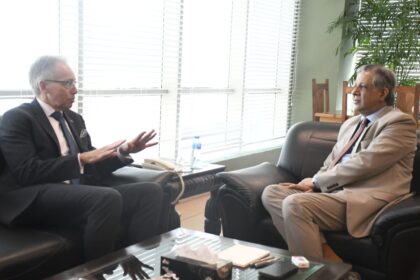Federal Minister for Health Mustafa Kamal said 70 percent of diseases in the country originate from contaminated water and warned that without adopting the principle that prevention is better than cure, public health cannot improve. Addressing the inaugural ceremony of a two-day regional seminar on Diabetes and Herbal Medicines at the Health Services Academy, he stressed that prevention, safe drinking water and stronger public-health infrastructure must accompany any expansion of hospital capacity.
The minister described diabetes as the mother of all diseases, saying one in four citizens in Pakistan now suffers from the condition and hospitals are overcrowded. He argued that no matter how many hospitals are built, the burden of illness will persist unless measures such as lifestyle medicine, clean water provision and local sewage treatment are prioritised. According to his estimates, ensuring clean drinking water could reduce pressure on hospitals by up to 70 percent.
Mustafa Kamal also pointed to pollution of water sources across the country from Gilgit-Baltistan to Karachi and urged the establishment of local-level sewage treatment systems. He voiced concern over anti-vaccination campaigns that spread misinformation despite the government offering free vaccines against 13 major diseases, and described the promotion of herbal medicines and natural treatment methods as timely and necessary.
Dr Shehzad Ali Khan said the rising prevalence of diabetes in Pakistan is alarming and warned that without making primary healthcare, improved nutrition, physical activity and timely screening national priorities, the healthcare system will face severe strain in coming years. He called for lifestyle medicine and research on herbal remedies to be integrated into national health policy to curb the growing diabetes burden.
Muhammad Ali, Commissioner of Social Security Punjab, highlighted a rapid increase in diabetes among the working class that is adding pressure to social security hospitals and underlined the need for widespread public awareness campaigns aimed at prevention. Mujeeb-ur-Rehman Qambrani, former Health Secretary Balochistan, pointed to the shortage of clean water and weak sewerage systems as key drivers of disease in Balochistan and urged targeted government attention to lower disease rates.
Professor Dr Muhammad Tariq of HSA noted the usefulness of herbs and plant-based ingredients in treating diabetes and said global research in this area is expanding quickly, with Pakistan needing to play an academic role. Professor Dr Shahid Baig, Dean of Life Sciences at HSA, emphasised that many plant-based compounds show promise in managing diabetes but must undergo rigorous scientific evaluation and approval before widescale use.
Dr Mati-ur-Rehman from Health Sciences attributed much of the disease spread to unhealthy lifestyles and a lack of physical activity, calling for national-level measures to reverse these trends. Professor Dr Samina Naeem expressed particular concern over rising diabetes among women, especially gestational diabetes during pregnancy, noting it is often overlooked despite risks to both mother and child.
The seminar underlined a combined agenda of ensuring clean water, improving sanitation, countering vaccine misinformation, promoting lifestyle medicine and advancing scientific research on herbal remedies as essential steps to reduce disease linked to contaminated water and relieve Pakistan’s strained hospitals.











